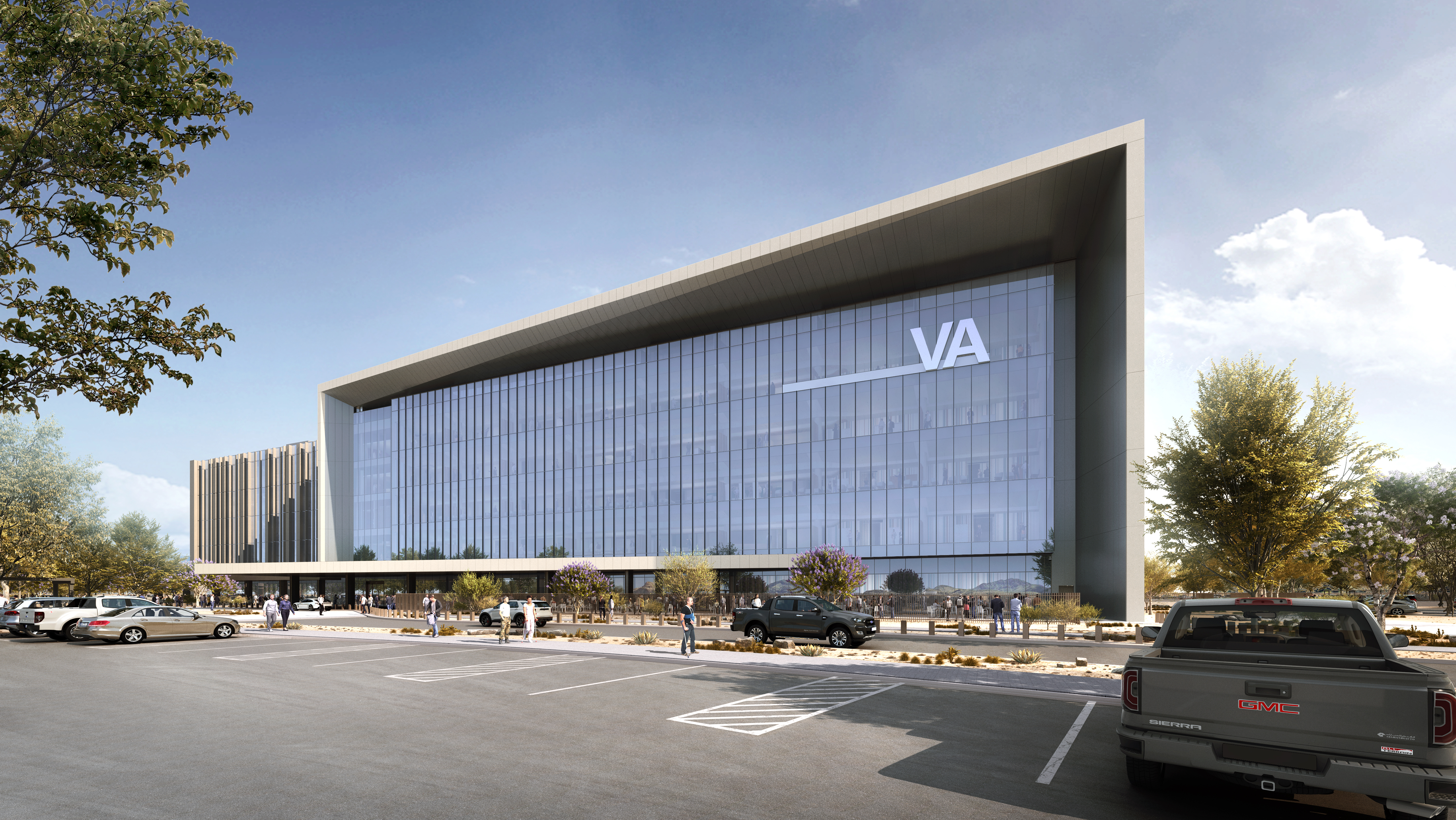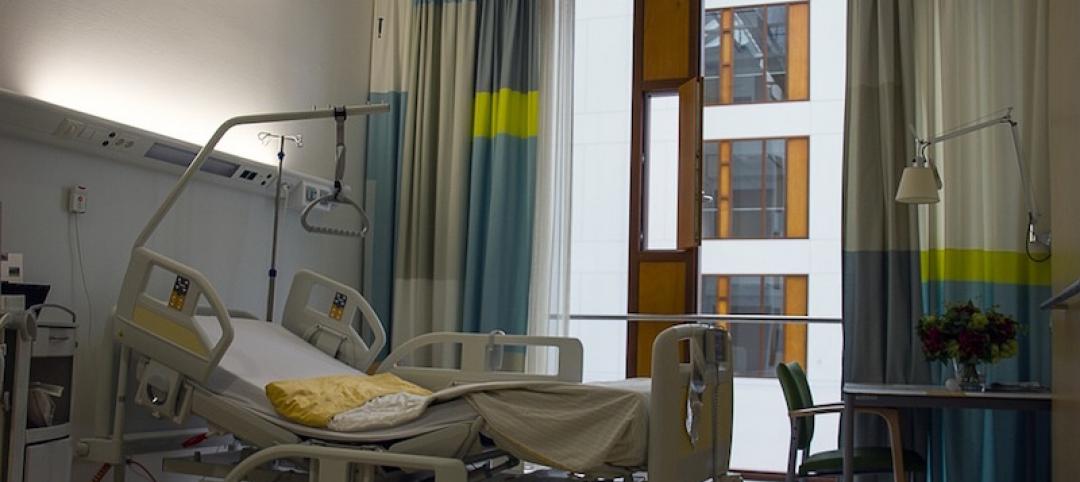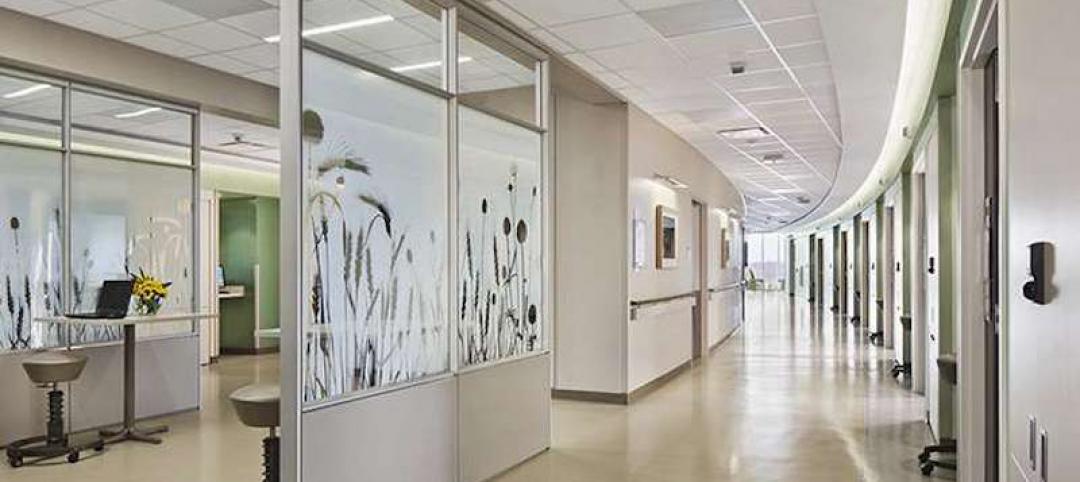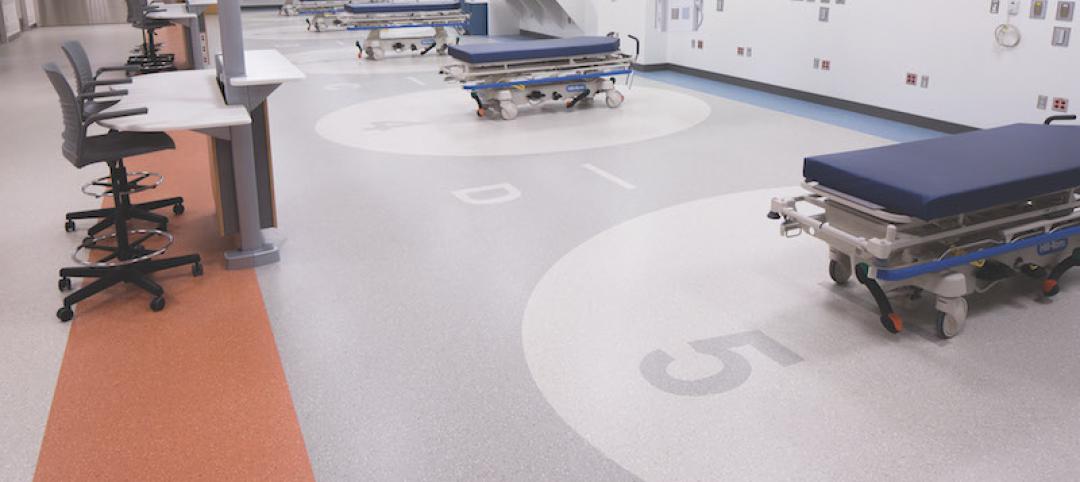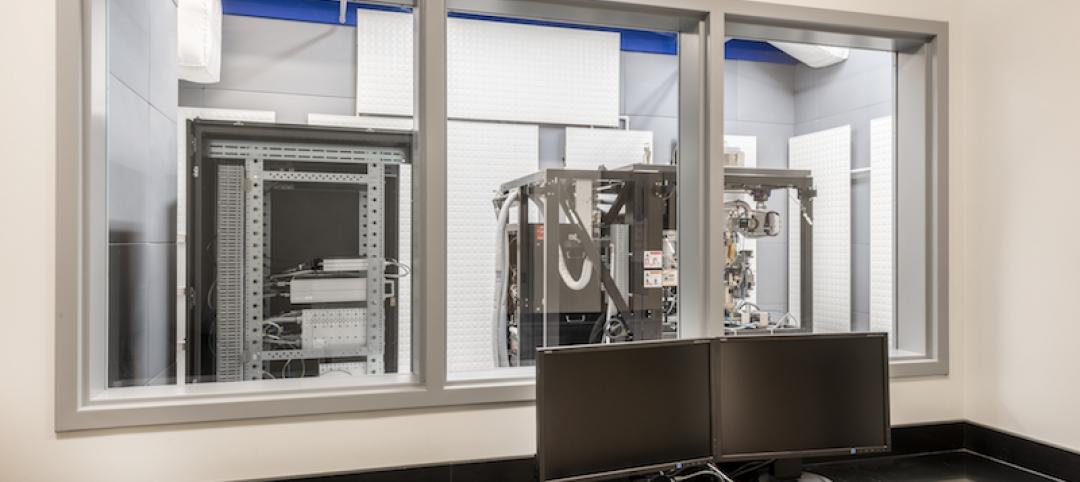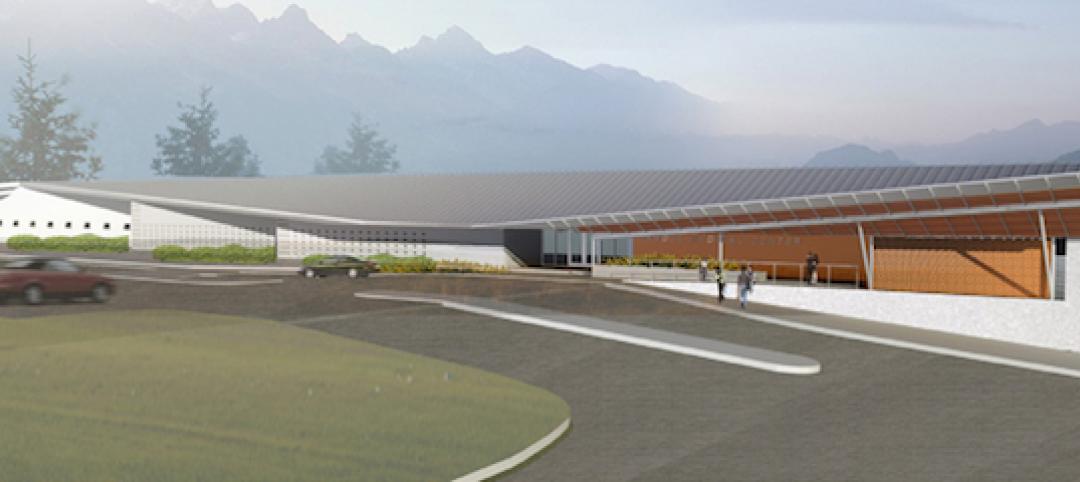A new 492,000-sf Veterans Administration ambulatory care facility on the William Beaumont Army Medical Center campus near El Paso, Texas will include 47 medical departments and provide brain and spinal cord injury treatment services. A design-build team of Clark Construction, SmithGroup, and HKS is spearheading the project that recently broke ground with anticipated completion in 2028.
The project will also include a new central utility plant and significant improvements to utilities, stormwater management, and parking facilities for the Fort Bliss campus. Public outdoor amenities bookend the entry canopy. To the northeast, an 18,000 sf healing garden, partially shaded by the building’s canopy, offers a tranquil space for respite. Toward the northwest, 6,500 sf of outdoor cafe seating connects to the interior canteen.
A 5,000-sf shaded staff plaza on the facility's south side connects the main staff entry to dedicated staff parking. Inside, a dynamic two-story lobby welcomes patients and their families with retail spaces and patient pharmacy flanking either side of the lobby. Radiology and pathology have dedicated spaces on either end of the first floor.
Interior design is inspired by the passage of the nearby Rio Grande River through the El Paso region. Soft, organic forms and curves at key points in the patient’s journey represent the fluidity of water, embodying the idea of renewal and regeneration on the path to good health. A rich, warm material palette inspired by the colors and textures of the desert and river trails grounds the interior design in the local community.
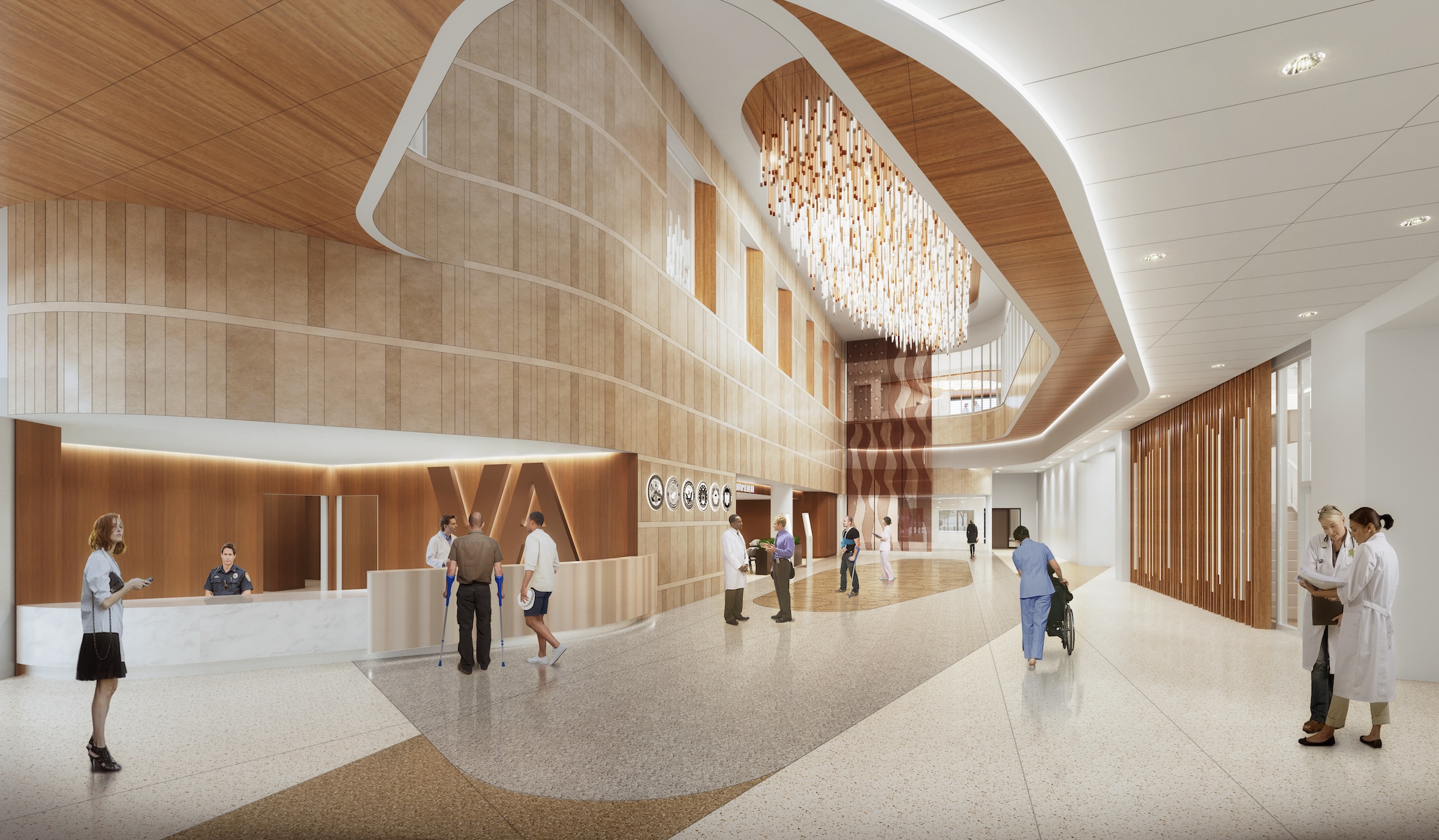
Indoor public spaces are oriented along the building’s northern façade to offer views of the nearby Franklin Mountains through an expansive glass curtain wall. Reception and waiting areas on each of the four clinical floors (levels 2-5) are also aligned along this northern façade to enjoy daylighting and views of the natural landscape, with staff workspaces and service spaces programmed behind clinical spaces along the southern spine of the building.
Audiology, prosthetics, and rehabilitation for traumatic brain and spinal cord injuries have dedicated space on level two, which also features specialty education rooms and administration spaces. The VA’s signature patient-aligned care team (PACT) clinics are on the third floor, with a specialized women’s clinic and spaces for mental health and substance abuse programs.
Level four features a dental suite, eye clinic, and surgical care to complement the ambulatory surgery unit and specialty ambulatory care (neurology, cardiovascular) on the fifth floor above. The sixth-floor penthouse features a north-facing outdoor staff terrace, administration space, and mechanical systems. The below-grade basement level of the health center contains back-of-house functions, including loading, laundry, engineering, and pharmacy.
The new health center is oriented to optimize environmental conservation and protection (solar, thermal, comfort, and wind), contributing to a goal of 30% energy reduction over prevailing building codes. Additionally, the building’s orientation forms a new campus entry and helps to minimize new parking areas on site, leaving a more natural landscape intact. Proposed arrays of photovoltaic panels above new parking areas will help to shade vehicles and generate energy on-site. The building is designed to exceed LEED Silver certification.
Owner and/or developer: U.S. Department of Veterans Affairs (VA)
Design architect: SmithGroup (interior); HKS (exterior)
Architect of record: SmithGroup + HKS Joint Venture
MEP engineer: Capital Engineering Consultants, Inc. (mechanical); Mazzetti (electrical)
Structural engineer: Cagley and Associates
General contractor/construction manager: Clark Construction Group
Related Stories
Healthcare Facilities | Feb 6, 2017
NYC cancer hospital rises to the occasion
A recent analysis of patient volumes showed that Memorial Sloan Kettering Cancer Center would run out of space for new construction at its Upper East Side campus in Manhattan in just a few years.
Healthcare Facilities | Feb 3, 2017
Urgent care centers: True pioneers of retail healthcare delivery
Hospitals, either individually or in joint ventures, run 37% of U.S. urgent care centers.
Healthcare Facilities | Jan 19, 2017
A survey challenges the efficacy of decentralized nurses station design
The Institute of Health + Wellness Design at the University of Kansas raised questions after reviewing a hospital’s renovated orthopedic unit.
Healthcare Facilities | Dec 22, 2016
Has ‘green’ delivered on its promise to the healthcare sector?
As we approach the end of the second decade of LEED, the financial costs and benefits of going green are well documented, write CBRE's Lee Williams and Steve Higgs.
Healthcare Facilities | Dec 13, 2016
How healthcare systems can reduce financial risk with developer-owned hospitals
When entering a new market, the financial risk can be magnified to the point that the investment – although critical to a system’s future – becomes unpalatable to a governing board.
Sponsored | Flooring | Dec 7, 2016
Reading Hospital expansion project saves two months in construction schedule thanks to nora nTx
Construction delays are common with projects as large as the $354 million Reading Hospital expansion. Maybe that’s why construction manager Jeff Hutwelker, project executive with LF Driscoll Co., LLC, was so pleased with his nora® experience. By Hutwelker’s estimates, nora nTx saved approximately two months in his construction schedule.
Healthcare Facilities | Nov 30, 2016
Utilizing real estate to build physician networks
How hospitals can partner with their doctors to build an ambulatory network.
Healthcare Facilities | Nov 10, 2016
Prescription for success: Managing technology in the design of healthcare facilities
While the benefits of intelligently deployed technology are abundantly clear to both designers and healthcare end-users, it’s no simple task to manage the integration of technology into a building program.
Public Health Labs | Nov 3, 2016
Cutting-edge microscope facility opens on UMass Medical’s campus
Design and construction met rigorous requirements for sound, vibration, and temperature controls.
Healthcare Facilities | Oct 31, 2016
A world unbuilt: The moral implications of design
The communications challenges don’t even begin to compare to the inherent challenges of designing for a developing nation, writes CannonDesign's Michael McManus.


